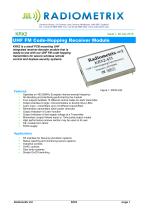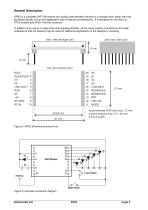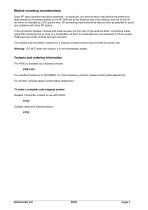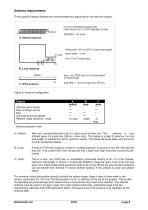
Catalog excerpts

KRX2 is a small PCB mounting UHF integrated receiver-decoder module that is ready-to-use with our UHF FM code-hopping transmitters for secure wireless remote control and keyless security systems. ■ Operates on 433.92MHz European licence exempt frequency ■ All decoding and interfacing performed by the module ■ Four outputs facilitate 15 different control codes for each transmitter ■ Output interface to logic, microcontrollers or directly drive LEDs ■ Learn input - remembers up to 16 different transmitters ■ Remembers transmitters when power removed ■ Output indication of Learn function ■ Output indication of low supply voltage at a Transmitter ■ Momentary (output follows input) or 10ms pulse output modes ■ High performance receiver section may be used on its own ■ DIL module form factor ■ 5VDC supply Applications ■ RF interface for Security and Alarm systems ■ Status reporting and monitoring secure systems ■ Industrial controls ■ HVAC controls ■ Door entry systems ■ Simple On/Off switching
Open the catalog to page 1
General Description KRX2 is a complete UHF FM receiver and rolling code decoder/interface in a compact form factor that may be placed directly into an end application with no special considerations. It is designed for use with our KTX2 module and KFX2 “Key-fob” products. In addition to its use as a ready-built code-hopping decoder, all the usual receiver connections are made available so that the receiver may be used for additional applications of the designer’s choosing. side view (through can) side view (with can) 6 mm 6 mm top view (without can) 1 RSSI RESERVED 2 0V 3 4 0V LRN (OUT) 5 6...
Open the catalog to page 2
Using KRX2 A simple connection diagram for experimental purposes is shown in Figure 3. The Mode switch is connected between MODE and 0V and the Learn button is connected between LRN (IN) and 0V. The antenna can be just a few centimetres of wire, for test purposes. Refer to antenna requirements at the end of this datasheet for operational recommendations. The 5V shown would normally be supplied by a regulated low-noise PSU. Remaining digital outputs are all connected to LEDs to show the operation of the module. CAUTION! Take care that the supply never exceeds 5.5 V, even momentarily: if this...
Open the catalog to page 3
Activating outputs Once a transmitter has been learned its transmissions will be acted upon, i.e. the function code contained within the transmission is fed to the KRX2 outputs S0 – S3. Either a 10ms single-shot output or a longer momentary output can be used according to the MODE selected. In the circuit shown in Fig. 3, closing the switch will select “momentary” mode. In 10ms “single-shot” mode the ouput(s) are activated for only 10ms (nominal) per message received. This means that regardless of whether someone “holds down the button” at the sending device, the KRX2 output will only be a...
Open the catalog to page 4
Figure 4: Timing diagram – showing action upon receiving a message with S0 = 1 Received Signal Strength Indication (RSSI) The KRX2 module incorporates a wide range RSSI that measures the strength of an incoming signal over a range of approximately 60dB. This allows assessment of link quality and available margin and is useful when performing range tests. Please note that the actual RSSI voltage at any given RF input level varies somewhat between units. The RSSI facility is intended as a relative indicator only - it is not designed to be, or suitable as, an accurate and repeatable measure of...
Open the catalog to page 5
Absolute maximum ratings Survival Maximums: Exceeding the values given below may cause permanent damage to the module. Operating temperature -Storage temperature DC supply (pin 8) RSSI, AF, RXD (pins 1,7,6) RF IN (pin 1) Digital inputs/outputs (DC supply = 5.0V / temperature = 20 °C unless stated) min. typ. max. units notes DC supply Supply voltage Supply current RF/ IF RF centre frequency RF sensitivity for 12dB (S+S/N) RSSI range IF bandwidth Image rejection IF rejection (10.7MHz) LO leakage, conducted Baseband AF level DC offset on AF out Distortion on recovered AF Load capacitance,...
Open the catalog to page 6
Module mounting considerations Good RF layout practice should be observed – in particular, any ground return required by the antenna or feed should be connected directly to the RF GND pin at the antenna end of the module, and not to the OV pin which is intended as a DC ground only. All connecting tracks should be kept as short as possible to avoid any problems with stray RF pickup. If the connection between module and antenna does not form part of the antenna itself, it should be made using 50Ω microstrip line or coax or a combination of both. It is desirable (but not essential) to fill all...
Open the catalog to page 7
Three types of integral antenna are recommended and approved for use with the module: 0.5 mm enameled copper wire close wound on 3.2 mm diameter former 433 MHz = 24 turns Feed point 15% to 25% of total loop length track width = 1mm 4 to 10 cm inside area o RF C. Whip antenna wire, rod, PCB-track or a combination of these three 433 MHz = 16.4 cm total from RF pin. Figure 6: Antenna configuration Feature ABC helical loop whip Ultimate performance ** * *** Easy of design set-up ** * *** Size *** ** * Immunity proximity effects ** *** * Relative range...
Open the catalog to page 8
Copyright notice This product data sheet is the original work and copyrighted property of Radiometrix Ltd. Reproduction in whole or in part must give clear acknowledgement to the copyright owner. Limitation of liability The information furnished by Radiometrix Ltd is believed to be accurate and reliable. Radiometrix Ltd reserves the right to make changes or improvements in the design, specification or manufacture of its subassembly products without notice. Radiometrix Ltd does not assume any liability arising from the application or use of any product or circuit described herein, nor for...
Open the catalog to page 9All Radiometrix catalogs and technical brochures
-
LNM2H
13 Pages
-
NiM1B
13 Pages
-
VX2M
9 Pages
-
WRX2C
9 Pages
-
MSR3
8 Pages
-
LMR0
10 Pages
-
SAT3
5 Pages
-
NTX2B
13 Pages
-
NTX0
8 Pages
-
MTX3
10 Pages
-
MTX2
10 Pages
-
BiM3H
8 Pages
-
QPX1
8 Pages
-
QPT1
8 Pages
-
AiM1
9 Pages
-
Universal Evaluation Kit
27 Pages
-
TDL2A Evaluation Kit
4 Pages
-
SPM2/RPM Evaluation Kit
7 Pages
-
SP2 Evaluation Kit
12 Pages
-
M48A Application Board
12 Pages
-
M1144
8 Pages
-
DXT / DXR
7 Pages
-
Control44 Evaluation Kit
7 Pages
-
CTA28 App. boards
11 Pages
-
BL118
7 Pages
-
BD118
5 Pages
-
PAN1311
2 Pages
-
PAN1310
2 Pages
-
m48a
11 Pages
-
LMR2
11 Pages
-
TDL3F
10 Pages
-
KTX2
8 Pages
-
RPM3
15 Pages
-
ENX1
11 Pages
-
NiM2
11 Pages
-
BiM1
15 Pages
-
RX3G
6 Pages
-
PLR2
12 Pages
-
MSR3
8 Pages
-
CXR2
12 Pages
-
COR3
8 Pages
-
TX2S
7 Pages
-
CXT2
12 Pages
-
KRX2
9 Pages
-
KFX2
4 Pages
-
KDEC
5 Pages
-
TXL2
11 Pages
-
Radiometrix
20 Pages




















































